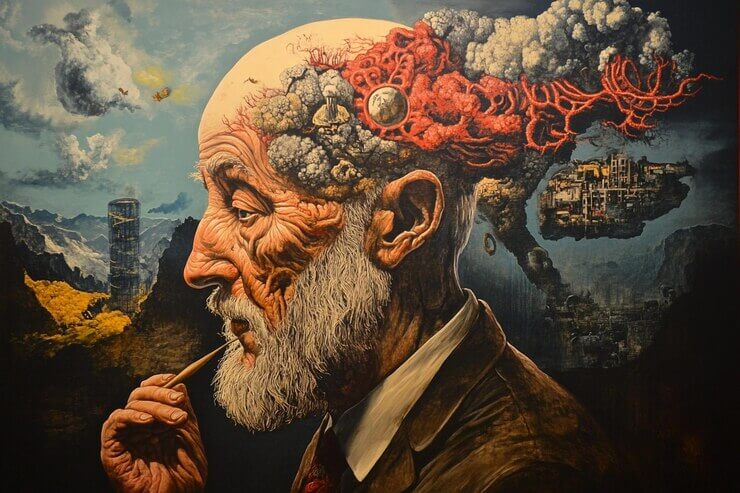Nihilism in Philosophy: Confronting the Abyss of Meaning
- “What if nothing matters?”
- This haunting question isn’t a cynical quip;
It is the core of a deep and complex philosophical tradition called “Nihilism in philosophy”.
- More people are encountering this philosophy than ever before due to the global rise in:
- Mental health crises, Spiritual questioning
- Cultural upheavals rise
- But is Nihilism a dead end?
- Or, a doorway?
Nihilism in Philosophy?

- At its core, Nihilism in philosophy refers to the belief that;
“Life lacks inherent meaning, value, or purpose.”
- The term derives from;
“The Latin word nihil, meaning “nothing.”
- Before we discuss nihilism further,
Let’s step into the emotional insight of nihilism through this poetic reflection.
“Nihilism in Philosophy” – A Poetic Reflection

In the depths of nihilism’s darkest night,
A void of meaning, a fading light.
Life’s purpose drifts like stars grown dim,
A silent war, both stark and grim.
The abyss yawns wide, cold, and deep,
A maze of thought where few dare creep.
Morals and truths—illusion’s thread,
In nihilism’s grip, all light seems dead.
Yet in this land so vast, so bare,
We search for sparks that linger there.
A glint of hope, a whisper, a flame,
A will to live, though none proclaim.
The thinker walks this shadowed track,
With questions sharp and answers black.
A journey through the void and pain,
To carve out meaning once again.
Key Forms of Nihilism
- Existential Nihilism
Argues that life is inherently meaningless.
- Moral Nihilism
Rejects the existence of absolute moral values.
- Epistemological Nihilism
Questions whether knowledge or truth is possible.
Nihilism in Philosophy: A Brief History
Nihilism didn’t erupt out of nowhere.
It has evolved over centuries:
- Predecessors
The seeds of nihilism can be found in skepticism and atheism from ancient Greece.
- Friedrich Nietzsche
The German philosopher warned of the “death of God” and the resulting moral vacuum in his famous work The Will to Power.
- Russian Nihilism
In the 19th century, Russian revolutionaries adopted nihilism as a rejection of social and religious institutions.
Nietzsche’s work doesn’t end at despair; he proposed that overcoming nihilism requires:
- Creating one’s values”
- Developing the “will to power”
- Becoming the “Übermensch”
Nihilism Today

- In today’s culture, nihilism is often linked with:
- Cynicism
- Depression
- Detachment
- Nihilist tones pervade society:
- From teenagers echoing,
“Nothing matters” on social media
- To modern art, that,
Reflects chaos and fragmentation.
But nihilism isn’t just about despair.
Storytelling Insight
Consider Maya, a young adult facing:
- Job rejection
- Climate anxiety
- Loneliness
Her dive into nihilist philosophy helps her realize that;
- The lack of preordained meaning doesn’t mean hopelessness.
- It opens a blank canvas for her to create her meaning.
Positive Side of Nihilism
- Encourages intellectual freedom
- Inspires personal responsibility
- Allows the mind to shed cultural baggage and institutional dogma
How to Navigate Nihilism: A Step-by-Step Guide
- Acknowledge the Void
Accept that nihilism is not inherently destructive.
It’s a lens to view the world without illusions.
- Explore Existential Alternatives
Dive into existentialism, Buddhism, or stoicism, which allow for personal meaning-making.
- Create Meaning Through Action
Practice values, create art, form connections;
Even if they aren’t objectively required.
- Seek Community and Conversation
Engage with others on platforms like raiseyourdimensions.com to explore deeply:
- Thought
- Awareness
- Growth
Conclusion: Making Peace with the Abyss
While Nihilism in philosophy may initially seem bleak, it offers a powerful reckoning with reality. In stripping away illusions, it invites us to rebuild truthfully. To live without false comfort is also to live with radical freedom.
FAQ: Nihilism in Philosophy
Q1: Is nihilism the same as depression?
A: No. While they can overlap, nihilism is a philosophical stance; depression is a mental health condition.
Q2: Can a nihilist still believe in love or art?
A: Absolutely. Personal values and emotions can thrive even in the absence of objective meaning.
Q3: Is nihilism dangerous?
A: It can be if misunderstood. But when approached reflectively, it can empower deep personal growth.
Q4: What are some books on nihilism?
A: There are many books on this topic that you may read.
- Nietzsche’s The Will to Power
- Camus’ The Myth of Sisyphus
- Ligotti’s The Conspiracy Against the Human Race.
Call to Action (CTA)
Have you encountered the void? Share your story or perspective on nihilism in philosophy in the comments below. Or explore more on RaiseYourDimensions.com as we question, reflect, and rise together.







